Example of Applying Moderator Cards to a Teaching Activity

The following serves as a worked example for developing an uncertainty tolerance teaching activity using the resources in this handbook. It is based on the exemplar activity presented in Chapter 11.
I am a clinical anatomy educator, and my first encounter with each cohort of medical students occurs when they are in the second semester of their first year at university. This learner population has relatively low subject proficiency as it relates to both the discipline (anatomy) and the educational context (university). The learners tend to be merit-minded, as inflexible assessments made up a large portion of their assessments for medical school entry. Furthermore, scientific disciplines tend to furnish much of the prerequisite knowledge for medical school entry, and the influence of this background has led to many in this learner population having an objective worldview.
Below are the moderator cards applicable to this learner population.
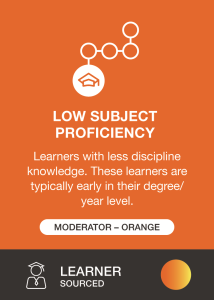
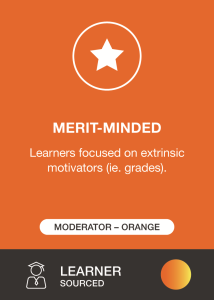
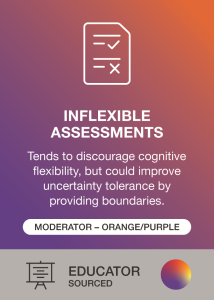
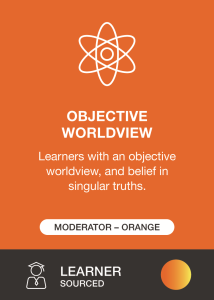
Given these learner-sourced moderators, I introduce career value of learning to manage uncertainty as a doctor by recounting a clinical case which illustrates how assuming certainty led to patient harm. In addition, I consider an orientation to the learning environment to be valuable. I introduce the uncertainty by setting a team-based task of working through a grey case. Knowing that the learners are most likely unprepared for adaptively responding to this uncertainty stimulus (given the learner-sourced moderators of this population), I build in further moderators which support the learners’ uncertainty tolerance development. For these learners with lower subject proficiency, the orientation includes clear role descriptions within the diverse teams and an outline of how to engage in diverse teamwork as the groups discuss and address the grey case.
Below are the moderator cards introduced by the educator.

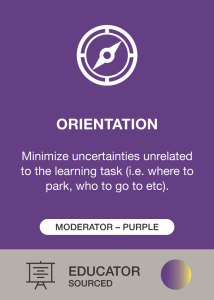
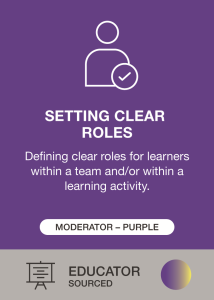
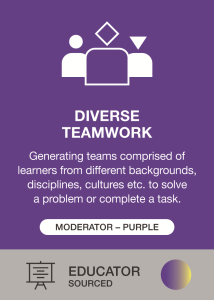
I also consider moderators at the institutional level, or system-sourced moderators. For instance, as I developed and reviewed this activity, I considered engaging with a community of practice of fellow educators interested in uncertainty tolerance teaching approaches to help me manage my own uncertainty in this educational context. The institution in which this activity is delivered has clear workforce performance standards which value innovative teaching approaches further supporting my ability to deliver this uncertainty tolerance teaching activity.
Below are the system-sourced moderator cards that need to be considered.
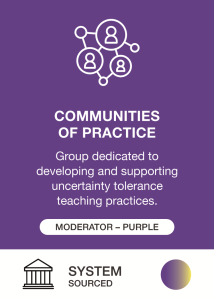

This teaching activity relies on the assistance of a group of facilitators who are trained in grey case facilitation. The training includes instruction on how to engage in intellectual candour, empathising with the learners’ experiences of frustration and discomfort when managing the uncertainty associated with the grey case while also explaining strategies that have helped them address similar uncertainty. Because there are multiple moderators supporting learners’ uncertainty tolerance, I introduce the moderator responsible for knowledge by having an individual student within each group report to the whole class the key elements of their discussions about the grey case. I do this to help learners gain this essential health profession skill of communication. This moderator is especially relevant once they have gained experience with the grey case format across a unit of study by scaffolding uncertainty through the curriculum across the two years of anatomy teaching. The biggest challenge in assessment is related to the inflexible assessments we are required to deliver. Therefore, the uncertainty tolerance teaching activity is developed with flexible, formative assessment approaches in mind.
Below are the additional moderator cards introduced during the activity and used to assess the uncertainty tolerance teaching activity.
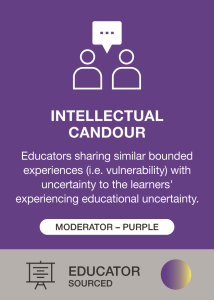
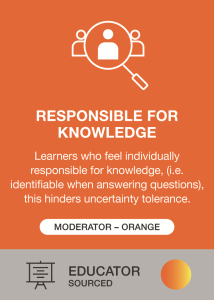
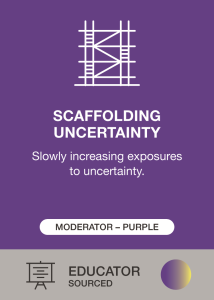

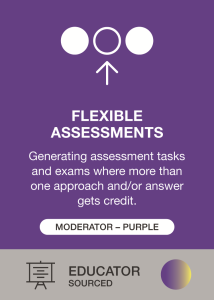
Media Attributions
- Purple-Orange Brain © Kat Orgallo is licensed under a CC BY-NC (Attribution NonCommercial) license
- Low Subject Proficiency Moderator Card © Kat Orgallo is licensed under a CC BY-NC (Attribution NonCommercial) license
- Merit-Minded Moderator Card © Kat Orgallo is licensed under a CC BY-NC (Attribution NonCommercial) license
- Inflexible Assessments Moderator Card © Kat Orgallo is licensed under a CC BY-NC (Attribution NonCommercial) license
- Objective Worldview Moderator Card © Kat Orgallo is licensed under a CC BY-NC (Attribution NonCommercial) license
- Career Value Moderator Card © Kat Orgallo is licensed under a CC BY-NC (Attribution NonCommercial) license
- Orientation Moderator Card © Kat Orgallo is licensed under a CC BY-NC (Attribution NonCommercial) license
- Setting Clear Roles Moderator Card © Kat Orgallo is licensed under a CC BY-NC (Attribution NonCommercial) license
- Diverse Teamwork Moderator Card © Kat Orgallo is licensed under a CC BY-NC (Attribution NonCommercial) license
- Communities of Practice Moderator Card © Kat Orgallo is licensed under a CC BY-NC (Attribution NonCommercial) license
- Workforce Performance Standards Moderator Card © Kat Orgallo is licensed under a CC BY-NC (Attribution NonCommercial) license
- Intellectual Candour Moderator Card © Kat Orgallo is licensed under a CC BY-NC (Attribution NonCommercial) license
- Responsible for Knowledge Moderator Card © Kat Orgallo is licensed under a CC BY-NC (Attribution NonCommercial) license
- Scaffolding Uncertainty Moderator Card © Kat Orgallo is licensed under a CC BY-NC (Attribution NonCommercial) license
- Flexible Assessments Moderator Card © Kat Orgallo is licensed under a CC BY-NC (Attribution NonCommercial) license

